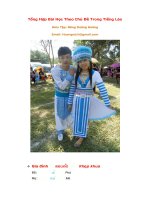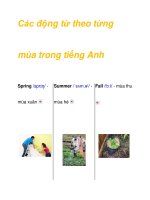Lỗi sai trong tiếng anh10 docx
Bạn đang xem bản rút gọn của tài liệu. Xem và tải ngay bản đầy đủ của tài liệu tại đây (149.29 KB, 6 trang )
They
BROUGHT
their books
home.
bouncy
(not
-ey)
See
ADDING ENDINGS (ii).
brackets
Round
brackets enclose additional information which
the
writer wants
to
keep separate
from
the
main
body
of the
sentence.
Jane
Austen
(born
in
1775) died
in
Winchester.
My
neighbour (have
you met
her?)
has won
£250,000.
Notice
how
sentences
in
brackets
are not
fully
punctuated.
They
don't
begin with
a
capital letter
or
have
a
full
stop
at the end if
they occur within another
sentence
as in the
example above. They
do,
however, have
a
question mark
or an
exclamation
mark,
if
appropriate.
Square
brackets indicate that
the
material
has
been
added
to the
original
by
another writer:
When
I
[Hilaire
Belloc]
am
dead,
I
hope
it may be
said:
'His
sins were scarlet,
but his
books
were
read.'
breath
or
breathe?
BREATH
is the
noun,
and
rhymes with
'death'.
He
called
for
help with
his
dying
BREATH.
BREATHE
is the
verb
and
rhymes with
'seethe'.
BREATHE
deeply
and fill
those
lungs!
brief,
briefly
(not
-ei-)
Britain
(not
-ian)
34
BOUNCY
BUT
Brittany
(not
Britanny)
broach
or
brooch?
You
BROACH
a
difficult
topic
or
BROACH
a
bottle.
You
wear
a
BROOCH.
broccoli
(not
brocolli)
broken
(not
brocken)
brought
See
BOUGHT
OR
BROUGHT?.
buffalo (singular)
buffalo,
buffaloes
(plural)
See
PLURALS (iv).
building
(not -iu-)
buisness
Wrong spelling.
See
BUSINESS.
bureau
bureaux, bureaus (plural)
Both forms
are
correct.
See
FOREIGN PLURALS.
bureaucracy
(not -sy)
burglar
(not burgular,
as
often
mispronounced)
burned/burnt
Both forms
are
correct.
business
(not buisness)
but
See
AND/BUT.
35
buy/by
Use
these exemplar sentences
as a
guide:
I
need
to BUY
some
new
jeans.
The
book
is BY
Charlotte Bronte.
Wait
BY the
gate.
The
children rushed
BY.
36
BUY/BY
cactus
(singular) cactuses
or
cacti (plural)
See
FOREIGN
PLURALS.
caffeine
(not
-ie-)
-cal/-cle
Adjectives
end in
-cal.
Nouns
end in
-cle.
e.g. critical
logical
magical
musical
nautical
physical
practical
theatrical
tropical
whimsical
calculator
(not
-er)
calendar
article
bicycle
circle
cubicle
cuticle
miracle
particle
spectacle
uncle
vehicle
calf
(singular) calves (plural)
See
PLURALS
(v).
callous
or
callus?
CALLOUS
means cruel, insensitive,
not
caring
about
how
others
feel.
CALLUS
means
a
hard patch
of
skin
or
tissue.
Interestingly,
skin
may be
CALLOUSED
(made
hard)
or
CALLUSED
(having calluses).
can or
may?
Strictly
speaking,
CAN
means
'being
able'
and MAY
means
'having
permission'.
It is
best
to
preserve this
37
H
CANING
OR
CANNING?
distinction
in
formal
contexts. However, informally,
CAN
is
used
to
cover both meanings:
You
CAN go now
(=
are
permitted).
caning
or
canning?
cane
+ ing =
caning
CANING
is now
banned
in all
schools.
Can + ing =
canning
The
CANNING
factory
is
closing down.
See
ADDING ENDINGS
(i) and
(ii).
canister
(not
-nn-)
cannon
or
canon?
A
CANON
is a
cleric.
A
CANNON
is a
large gun.
cannot
or can
not?
Both
forms
are
acceptable
but the
second
is
rarely
seen.
canoe
canoed, canoeing, canoeist
See
ADDING ENDINGS (ii).
canon
See
CANNON
OR
CANON?.
can't
Contraction
of
CANNOT.
canvas
or
canvass?
CANVAS
is a
rough
cloth.
To
CANVASS
is to ask for
votes.
capital
letters
Use
a
capital letter
in
these circumstances:
to
begin
a
sentence:
38
CAPITAL
LETTERS
My
father
will
be fifty
tomorrow,
to
begin sentences
of
direct speech:
'You
will
be
sorry
for
this
in the
morning,'
she
said.
She
said,
'You
will
be
sorry
for
this
in the
morning.
You
never
learn.'
for
the
pronoun
T
wherever
it
comes
in the
sentence:
You
know that
I
have
no
money,
for
all
proper
nouns
-
names
of:
people
(Mary
Browne)
countries
(Malta)
languages
(French)
religious
festivals
(Easter,
Diwali)
firms
(Express
Cleaners)
organisations (the British Broadcasting
Corporation)
historical periods (the Renaissance)
(the
Neolithic Period)
days
of the
week (Monday)
months
of the
year (September)
but
not
usually
the
seasons
Note
these adjectives derived
from
proper nouns also
have
a
capital letter:
a
Jewish
festival;
a
German poet
However,
the
capital
is
dropped
when
the
connection with
the
proper noun becomes lost:
Venetian
blinds,
french
windows
Note
also that titles
are
capitalised only when part
of
a
proper noun:
Bishop
Christopher Budd, otherwise
the
bishop
Aunt
Gladys, otherwise
my
aunt
39









